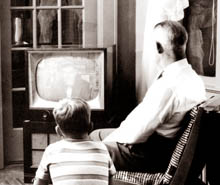
Day to celebrate the television
Most of you may be huge TV fans and return home from school with the
sole intention of switching on the television. Even if you are not, you
may certainly enjoy watching TV. But did you know that a special day has
been set apart by none other than the United Nations to observe the
significance of television in the world?
Yes, this day, known as the World Television Day, is observed on
November 21. Celebrations are led by the UN Educational, Scientific and
Cultural Organisation (UNESCO).

The day was declared by the UN General Assembly in 1996 to encourage
global exchanges of television programmes focusing on peace, security,
economic and social development and the enhancement of cultural
exchange. The announcement regarding the event was made at the 99th
plenary meeting of the Assembly, on December 17, 1996. November 21 was
chosen because the first World Television Forum was held on that day in
1996, when media figures from around the world gathered to discuss the
role of television in the modern world.
The TV is, of course, one of the most powerful forms of media today.
It is a medium where images, sounds, technologies, styles and ideas are
combined to bring a complete product to viewers. Television is popular
because of the convenience it offers to its worldwide audience,
regardless of age, nationality and social status.
Television does not require literacy (ability to read and write) and
presents its information in audiovisual form, so that no extra skills
are necessary to understand it. It is a key part of the world's
'information society'. The TV is one of the primary means of
communication and a standard gateway of information for the public,
especially in less developed countries.
It contributes effectively to spreading information and knowledge,
and is a powerful tool for reflecting and shaping human conditions and
hopes.
Some of UNESCO's main aims through this Day are to foster freedom of
expression and increase cultural diversity (variation) in the media,
particularly by improving production capacities, distribution and
quality of audio-visual programmes.
UNESCO promotes universal access to information and knowledge through
quality and diverse content, reflecting the needs, concerns and
expectations of the various audiences, especially the disadvantaged
communities.
UNESCO's action focuses on enhancing (increasing) the utility of
televisions as an educational and cultural vehicle; on advising member
states on legal, regulatory, financial and other major issues; and on
encouraging media professionals to reduce violence both in news and
fictional (imaginary) programmes in electronic media with special
emphasis on children and youth.
This strategy is carried out by providing training, funding local
productions and establishing platforms for local content distribution
for television authors, producers and broadcasters. UNESCO believes that
sustaining high quality television programming results in a
well-informed and enlightened public which can participate in public
debates and struggle for political issues of common interest, thus
emphasising the important role television plays in promoting democracy.
The UN and UNESCO have called for the world's television
professionals to work together with them to ensure that television
contributes to progress and to the well-being of the people of the
world. |


